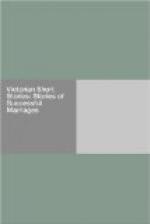Apart from this awkwardness she did not much mind the accident. It was indeed curious to see how little she minded. Perhaps it would not be too much to say that, although she was going to do the critical deed of her life quite willingly, she experienced an indefinable relief at the postponement of her meeting with Heddegan. But her manner after making discovery of the hindrance was quiet and subdued, even to passivity itself; as was instanced by her having, at the moment of receiving information that the steamer had sailed, replied ‘Oh’, so coolly to the porter with her luggage, that he was almost disappointed at her lack of disappointment.
The question now was, should she return again to Mrs Wace, in the village of Lower Wessex, or wait in the town at which she had arrived. She would have preferred to go back, but the distance was too great; moreover, having left the place for good, and somewhat dramatically, to become a bride, a return, even for so short a space, would have been a trifle humiliating.
Leaving, then, her boxes at the station, her next anxiety was to secure a respectable, or rather genteel, lodging in the popular seaside resort confronting her. To this end she looked about the town, in which, though she had passed through it half-a-dozen times, she was practically a stranger.
Baptista found a room to suit her over a fruiterer’s shop; where she made herself at home, and set herself in order after her journey. An early cup of tea having revived her spirits she walked out to reconnoitre.
Being a schoolmistress she avoided looking at the schools, and having a sort of trade connection with books, she avoided looking at the booksellers; but wearying of the other shops she inspected the churches; not that for her own part she cared much about ecclesiastical edifices; but tourists looked at them, and so would she—a proceeding for which no one would have credited her with any great originality, such, for instance, as that she subsequently showed herself to possess. The churches soon oppressed her. She tried the Museum, but came out because it seemed lonely and tedious.
Yet the town and the walks in this land of strawberries, these headquarters of early English flowers and fruit, were then, as always, attractive. From the more picturesque streets she went to the town gardens, and the Pier, and the Harbour, and looked at the men at work there, loading and unloading as in the time of the Phoenicians.
‘Not Baptista? Yes, Baptista it is!’
The words were uttered behind her. Turning round she gave a start, and became confused, even agitated, for a moment. Then she said in her usual undemonstrative manner, ‘O—is it really you, Charles?’
Without speaking again at once, and with a half-smile, the newcomer glanced her over. There was much criticism, and some resentment—even temper—in his eye.
‘I am going home,’ continued she. ‘But I have missed the boat.’




